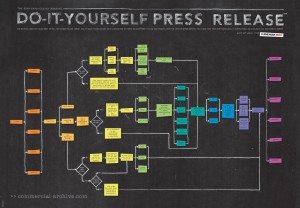DPF’s post mentioning MediaCom, which allows you to get/send press releases via NZPA feed, reminded me of this, which I’ve been meaning to post for awhile. The reason PR companies need to spam people with press releases is because at a basic level they’re so easy to write that almost any idiot can hack one out in half an hour, and so people do. If you’re someone who relies on them, by the time you’ve read the title and the first three paragraphs in order to figure out whether the press release has anything relevant for you, its writer has already won.
Not to say that writing good press releases is easy – far from it, writing genuinely good press releases is extremely hard; so hard that very few people actually can, and even for those people it can seem futile because nobody knows whether your press release is any better than all the rest of the guff which is clogging their intertubes until they’ve read the title and the first three paragraphs. If you’re a CommsTart,* this is a very important skill, however, because by writing good press releases you give the overworked, underpaid minions of the Corporate News Machine a labour-saving device, and if you can consistently write to spec they will gladly shortlist your releases for pre-publication, sight unseen, because they don’t have time to read the title and the first three paragraphs because … well …
That stuff in them there press releases ends up in your media. I don’t have it to hand (Kate, can I have it back?), but I seem to recall that very thorough Cardiff University research commissioned by Nick Davies’ for his excellent book Flat Earth News found that no more than 12% of articles published in major British papers were entirely free from material published by someone’s PR department or agency. In my work as a media analyst, if I actually want to find out about a major issue I go to Scoop and try to triangulate the facts from everyone’s press releases before I bother with the actual end-user media outlets. It’s rare they can tell me something the stakeholders’ CommsTarts haven’t already.
These facts – it’s easy to do badly, hard to do well, indispensable and ubiquitous – are not lost upon the wags of the media world, who have taken delight in lampooning this most cherished aspect of their craft. There are lots of press release generators out there. Most are good for a black bit of fun – this by one of our few remaining satirists Lyndon Hood only deals with the the one topic of child abuse, but it has good bones.
For the 80th birthday of AdNews, the Sydney office of Clemenger BBDO made this handy visual self-congratulatory press release generator:

(From commercial-archive.com.)
They know their stuff: this remains one of the best ways of quickly and efficiently putting together a quality press release – chop all the information up into bits of paper and arrange it so it flows, with just (barely) enough glue to keep people reading. Remember: the title and three paragraphs, and you win.
If you want industrial-strength, this one is made of much sterner stuff. Written by a computer programmer back in the Nineties and endlessly hacked on since, it and its variations will generate a dense blob of impressive verbiage – Bush-speak, web jargon, whatever you want. If fed the right source material, it would probably generate a halfway-competent press release.
It goes the other way, too – David Slack, in homage to George Orwell and Christopher Ketcham, created a DuckSpeak Translator which, if fed media-ready prose, would deliver you a lot of QUACKs and perhaps (if you were very fortunate or the author was very clever) a few actual words and even an idea. The DuckSpeak Translator is sadly no more, brought to its knees by the fact that David allowed any old idiot to add phrases to its vocabulary, so that by the time I got to using it sometime in 2006 it was so thoroughly clogged that you could put anything in and get nothing back but quacks – which may have been the intention after all. I think the project should be revived with a clean database, and phrases only admitted to its vocabulary if they have been taken cleanly from some rich source of such matter – such as the Hansard, or press releases. That’d be something worth quacking about.
L
* I use the term in gender-neutral reference to anyone whose work is tarting up their client’s self-interest so it can be mistaken for news.
Edit: Heh, the `or three’ on the end of the title was an afterthought added without reference to the previous post, which also contains it :)

Oh Lew… you do love your media hacks don’t you?
I don’t really have too much of a problem with good press releases – they make life a hell of a lot easier to figure out what they’re pitching – it’s the bad ones (of which I’m becoming quite acquainted with during the corporate results season) that really annoy me.
Bill Bennett has an excellent excellent post on how to craft these vile things:
http://billbennettnz.wordpress.com/2008/09/02/ten-tips-to-ensure-your-press-releases-fail/
Well worth a read…
PB.
(If I recall correctly, Kate was going to finish Flat Earth News in three days… hmmm, flashback to my library days…)
You’re right, PB, she was. I’ll try to extract it from her today.
And I agree – good press releases are good. Bennett’s thing is nice and wry. I also reckon that the wonderful Emma Hart’s How To Make a Stupid Law could trivially be adapted to press releases, too.
L